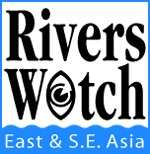
|
Affected peoples and NGOs from all over East and SE Asia adopted the rallying cry of the Thai peoples' movement Assembly of the Poor at the first East and SE Asia Regional Meeting on Dams, Rivers and People, held in Thailand, from June 29-July 2, 2000. For four days more than 60 people from fourteen countries gathered in Kong Jiam, Thailand, at the mouth of the Mun River, five kilometers from the site of the historic and ongoing battle over the Pak Mun Dam. The participants came together to share experiences on the impacts of dams and other river development projects in the region and discuss how to collaborate in the future to protect rivers and repair the damage caused by existing dams. Coming from a wide array of backgrounds, including dam-affected people from Malaysia, Korea, Thailand, the Philippines, Taiwan and Cambodia, participants produced the Pak Mun Declaration, calling for a moratorium on large dam construction, decommissioning of existing dams and reparations for dam-affected peoples.
Participants agreed to establish a network to work collaboratively in
the future. Rivers Watch East and SE Asia (RWESA) was launched on July
4, 2000 and is open to anybody who shares the sentiments of the Pak Mun
Declaration. RWESA Vision RWESA aims
to protect the health of river ecosystems to sustain Recognizing that development has benefited those who have had the power to appropriate resources for unbalanced economic interests, RWESA believes that consumption and distribution of resources must be based on principles of ecological sustainability and social justice. RWESA also aims to restore rivers which have been damaged by destructive development and to secure reparations to affected communities. RWESA Objectives The objectives of RWESA are to:
|